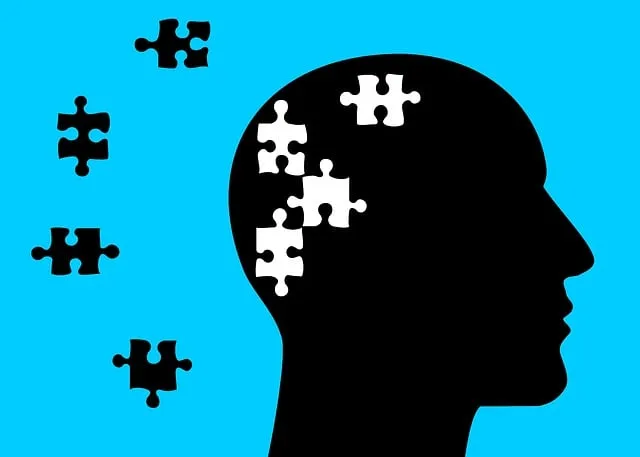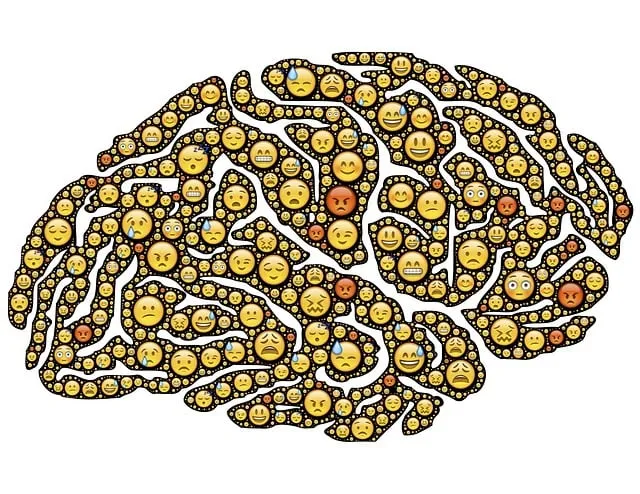Emotional intelligence (EI) is a critical component of modern healthcare, particularly at Kaiser Permanente in Broomfield, where their Mental Health Approach prioritizes mental well-being. This involves managing personal and patient emotions through effective communication strategies and stress management techniques. For mental health professionals in Broomfield with diverse patient backgrounds, cultural sensitivity is key to developing EI. Integrating mindfulness and stress management into practices improves patient outcomes, job satisfaction, and creates a supportive work environment. Kaiser Permanente's continuous self-reflection programs and mental health policy advocacy strengthen emotional intelligence, fostering better patient care and team dynamics. The success of EI training is measured through structured assessments, tracking personal and organizational changes to demonstrate its transformative impact on patient care and job satisfaction in Kaiser Permanente mental health jobs Broomfield.
Emotional intelligence (EQ) is a game-changer in healthcare, particularly within Kaiser Permanente’s mental health approach. This article explores why enhancing EQ matters in Broomfield’s healthcare environment and provides practical strategies for mental health professionals to navigate this crucial aspect of their roles effectively. We delve into proven methods to improve patient outcomes and team dynamics, measured through impact evaluations. By understanding the Kaiser Permanente model, healthcare workers can revolutionize care delivery in Broomfield and beyond.
- Understanding Emotional Intelligence: The Kaiser Permanente Mental Health Approach
- Why Building Emotional Intelligence Matters in Broomfield's Healthcare Environment
- Practical Strategies for Enhancing EQ in Mental Health Roles
- Measuring Success: Evaluating the Impact of Emotional Intelligence Training
Understanding Emotional Intelligence: The Kaiser Permanente Mental Health Approach

Emotional intelligence (EI) is a vital component in modern healthcare practices, particularly as organizations like Kaiser Permanente prioritize mental well-being. The Kaiser Permanente Mental Health Approach recognizes that EI isn’t just about individual therapy; it’s an organizational culture that permeates every aspect of patient care. This approach emphasizes the importance of understanding and managing one’s own emotions, as well as recognizing and responding appropriately to the emotions of those around them—a key aspect of building strong patient-provider relationships.
In the context of mental healthcare jobs in Broomfield, cultural sensitivity plays a significant role in EI development. Effective communication strategies are essential for navigating diverse patient backgrounds, ensuring every individual feels heard and respected. By integrating stress management techniques into their practices, mental health professionals can enhance their EI, leading to improved patient outcomes and satisfaction. This holistic approach not only benefits patients but also fosters a supportive work environment where professionals can thrive and grow in their careers at Kaiser Permanente.
Why Building Emotional Intelligence Matters in Broomfield's Healthcare Environment

In the bustling healthcare environment of Broomfield, where professionals from Kaiser Permanente mental health jobs strive daily to provide optimal patient care, emotional intelligence stands as a game-changer. It’s not just about clinical expertise; it’s about understanding and connecting with patients on an emotional level, fostering trust and empathy in what can often be stressful situations.
Emotional intelligence enables healthcare workers to recognize and manage their own emotions effectively, promoting self-care routine development for better mental health. This, in turn, enhances their ability to remain calm under pressure, provide clear communication, and offer compassionate support. Practices such as mindfulness meditation and stress management techniques, integral components of emotional intelligence, can help professionals navigate the labyrinthine challenges of healthcare. By prioritizing these strategies, Kaiser Permanente in Broomfield can ensure its staff are equipped not just to treat patients’ physical needs but also to nurture their mental well-being.
Practical Strategies for Enhancing EQ in Mental Health Roles

Emotional intelligence (EQ) is a vital asset for professionals in mental health roles at Kaiser Permanente Broomfield. To enhance EQ, several practical strategies can be employed. One effective approach is to engage in continuous self-reflection and awareness exercises, such as mindfulness meditation or emotional check-ins throughout the day. This helps individuals recognize their own emotions and those of others, fostering a deeper understanding and empathy.
Additionally, regular participation in mental health policy analysis and advocacy programs can provide valuable context for practitioners. By delving into community outreach program implementations and adopting mind over matter principles, professionals can better support clients while navigating complex systems. These strategies not only strengthen EQ but also contribute to improved patient outcomes and a more holistic approach to mental health care.
Measuring Success: Evaluating the Impact of Emotional Intelligence Training

Measuring success is a vital aspect of any training program, and emotional intelligence (EI) development is no exception. At Kaiser Permanente mental health jobs in Broomfield, we understand that evaluating the impact of EI training goes beyond mere self-assessment. It involves assessing both individual and organizational changes to ensure sustainable growth. This includes tracking improvements in self-awareness exercises and stress management techniques among healthcare providers, as these skills are crucial for cultural competency training.
By implementing structured assessment tools, we can gauge how participants translate learning into practice. This might involve pre- and post-training surveys, peer feedback, and supervisor evaluations to capture the tangible benefits of EI development. Through these methods, we aim to reveal the transformative power of emotional intelligence in enhancing patient care, team dynamics, and overall job satisfaction within the healthcare setting.
Emotional intelligence (EQ) is a powerful tool for professionals in the healthcare sector, particularly in Kaiser Permanente mental health jobs in Broomfield. As discussed, understanding and developing EQ can significantly enhance patient care and overall job satisfaction. By implementing practical strategies and measuring success through training evaluations, organizations like Kaiser Permanente can foster a more compassionate and effective work environment. Investing in emotional intelligence building is not just beneficial for individuals; it ensures a healthier, more resilient mental health care system.






